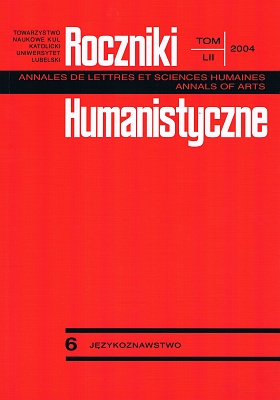Pleonasms and Tautology in the Awareness of Young Poles
Abstract
The article is a description of questionnaires on how Polish redundant collocations are estimated by Poles. The questionnaires were completed by 205 people (men and women) aged 16 to 60 years, with primary, secondary or university education, being pupils, students, office workers or labourers, living in different towns. The questionnaire contained 30 sentences with redundant collocations representing a few types, distinguished by the following criteria: the capacity of the semantic connectability of the related parts; the degree of the phraseologisation of the collocation, semantic ability of gradation of the subjected part; appearance of the foreign word within collocation, redundance on the morphological and syntactic levels.
The collocations of the sentences of questionnaire are: zaspy śniegu, broczyć krwią, wymyślić z głowy, zejść w dół, założyć [coś] z góry, dobra przyjaciółka, wiadomości serwisu informacyjnego, dobrze wychowana dama, szesnasta po południu, zdać pomyślnie, dobrze harmonizować, najbardziej podstawowy, dobra komitywa, scalić w całość, donosiciele donieśli, bardziej nowocześniejszy, zestawić ze sobą, przysunąć bliżej, krótka chwilka, pobolewa czasami, rozumieć się nawzajem, załóżmy razem [np. spółkę], pożyczyłem Ci mój [sweter], nie poinformować wcale, w ogóle nie stało się nic, ale jednak, napotykać na, samonapędzający się, zwykle mówi się, bezwiednie chce mi się.
On the ground of the survey we can define which collocations are most rarely or most often recognized by Poles as incorrect and what it depends on; to put it another way: which types of redundancy are most and less acceptable in Polish. It appeared that collocations with morphological or morphological and lexical redundancy (for example bardziej nowocześniejszy, wymyślić z głowy, donosiciele donieśli) and those with semantic ability of gradation of the subjected part (for example krótka chwilka, dobrze harmonizować, zdać pomyślnie) are most often recognized as incorrect. What is interesting, the foreign word within collocation does not affect the way it is recognized by native speakers (in opposition to previous linguists' opinions).
Copyright (c) 2004 Roczniki Humanistyczne

This work is licensed under a Creative Commons Attribution-NonCommercial-NoDerivatives 4.0 International License.





